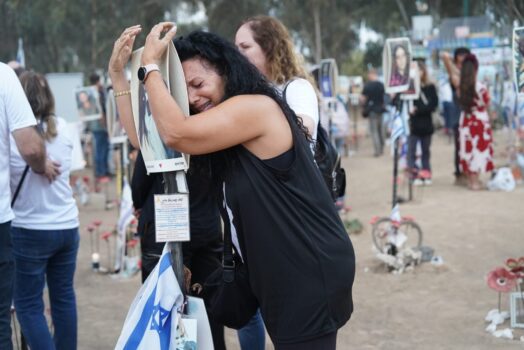 On Monday, Israelis commemorated the first anniversary of a deadly Hamas attack that ignited a war sparking global protests and raising fears of a broader conflict in the Middle East. Ceremonies and protests took place across Jerusalem and Israel’s south, beginning at 06:29 a.m. (0329 GMT)—the time when Hamas-led militants launched rockets into Israel on October 7, 2023.
On Monday, Israelis commemorated the first anniversary of a deadly Hamas attack that ignited a war sparking global protests and raising fears of a broader conflict in the Middle East. Ceremonies and protests took place across Jerusalem and Israel’s south, beginning at 06:29 a.m. (0329 GMT)—the time when Hamas-led militants launched rockets into Israel on October 7, 2023.
The attack claimed around 1,200 lives and led to the abduction of approximately 250 hostages who were taken to Gaza, according to Israeli figures. Around 300 people gathered outside Prime Minister Benjamin Netanyahu’s residence in Jerusalem, led by families of hostages holding up photos of their loved ones. A minute of silence was observed, marked by the sounding of a siren. “We’re still stuck in October 7th, 2023, in one unending day of terror, of fear, of anger, of despair,” said Yuval Baron, whose father-in-law is one of the hostages.
In Reim, the site of a music festival where over 360 people were killed and dozens abducted, a memorial ceremony was held, beginning with the last song played at the event a year ago. President Isaac Herzog, who presided over the ceremony, emphasized the need for unity and remembrance of those lost. “We will remember always who kidnapped, who murdered, who raped, who slaughtered,” Herzog stated.
Security was heightened across Israel in anticipation of possible Palestinian attacks marking the anniversary of the Oct. 7 assault, the deadliest day in Israel’s history. Movement restrictions were imposed in the Israeli-occupied West Bank, with many checkpoints shut down and some Palestinians receiving messages barring their entry into Israel.
Meanwhile, the Israeli military reported foiling a planned rocket attack by Hamas in Gaza. The assault by Hamas on Israeli communities around Gaza and the subsequent retaliatory military campaign by Israel have destabilized the region. According to Palestinian health authorities, nearly 42,000 people have been killed and most of Gaza’s 2.3 million population has been displaced.
Global vigils and demonstrations took place in response to Israel’s offensive in Gaza, which has drawn international condemnation for the destruction caused to the densely populated enclave.
The surprise assault by Hamas last year was described as one of Israel’s worst security failures, shaking the country’s sense of safety and faith in its leadership. The attack targeted civilians, including women, children, and the elderly, as well as soldiers at military bases near the Gaza border. Some of the deadliest scenes unfolded at an outdoor music festival near Reim, where hundreds were killed or taken hostage.
Israel’s military continues its offensive against Hamas in Gaza, with the aim of dismantling the militant group’s rule and military capabilities. Currently, 101 hostages remain in Gaza as Israeli forces push forward with their mission.
The conflict has since expanded to the north, with exchanges of fire between Israeli forces and Hezbollah fighters in Lebanon after the Iranian-backed group launched a barrage of missiles in support of Hamas on October 8. What began as limited exchanges has escalated to large-scale bombardments of Hezbollah’s stronghold in Beirut and ground operations targeting fighters in border villages. This has led to the displacement of over a million people from southern Lebanon.
Recent months have also seen Israeli operations targeting leaders of Hezbollah and Hamas, and a sophisticated attack on Hezbollah communications has restored some security for Israelis. However, these actions have prompted missile attacks from Iran, heightening concerns of a potential regional war. While Israel has yet to respond to the latest missile strike from Iran on October 1, officials have vowed a severe response.

White House Says Military Option Open On Greenland Acquisition
Trump Calls Case Against Maduro “Infallible” Ahead Of U.S. Court Appearance
South Africa Raids U.S. Refugee Processing Centre, Arrests Seven Kenyans
Time Magazine Names AI Visionaries ‘Person of the Year’